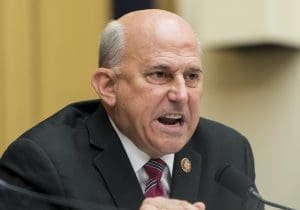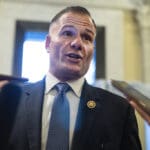113 House Republicans vote to keep Confederate statues on display in Capitol
The House voted 305-113 to stop displaying the statues in public view.

One hundred thirteen House Republicans voted on Wednesday to keep Confederate statues on display in the U.S. Capitol building.
The House voted by a margin of 305-113 to remove statues of persons “who served as an officer or voluntarily with the Confederate States of America or of the military forces or government of a State while the State was in rebellion against the United States.”
The bill would also remove statues of other racist officials, namely white supremacist Charles Brantley Aycock, slavery enthusiast John Caldwell Calhoun, and “white standards of civilization” defender James Paul Clarke. It instructs that a bust of Supreme Court Justice Roger Taney, author of the infamous Dred Scott decision, be replaced with one of Justice Thurgood Marshall in the Old Supreme Court Chamber.
Each state is allowed to donate two statues of “persons notable in their history” for display in the Capitol’s National Statuary Hall Collection. This bill would allow states who have selected Confederates to transport them home and replace them with others.
As the Hill reported in June, current statues on display include former Confederates Joseph Wheeler of Alabama, Uriah Milton Rose of Arkansas, Edmund Kirby Smith of Florida, Alexander Hamilton Stephens of Georgia, Edward Douglass White of Louisiana, Jefferson Davis and James Zachariah George of Mississippi, Zebulon Baird Vance of North Carolina, Wade Hampton of South Carolina, Robert E. Lee of Virginia, and John Kenna of West Virginia.
The legislation comes as communities across the world have begun removing monuments to racist figures, often in response to pressure from anti-racism protesters.
On Tuesday, a descendant of Robert E. Lee and several Black historians urged Congress to remove the statues. “We cannot remain silent anymore,” Robert W. Lee told a House subcommittee. “If we do so, our silence becomes agreement and endorsement to complicity.”
But Donald Trump and other Republicans have defended Confederate memorials in recent months, suggesting that removing them equates to “erasing our history.”
“I don’t like it. I’m not one that likes it. I think we have a history….” Trump said in an interview in June. “It’s a very important part of our history. Seeing that, seeing what’s on — you know, in some cases, I agree there were Confederate soldiers, generals, but they were done after the war in order to heal. This was a gesture of healing.”
The House bill faces an uncertain future in the Senate, where Senate Majority Leader Mitch McConnell has blocked hundreds of pieces of legislation from even getting a vote.
McConnell (R-KY) told reporters in June that he has no intention of removing the statues, unless states decide they want to do so.
“Every state is allowed two statues, they can trade them out at any time … a number of states are trading them out now. But I think that’s the appropriate way to deal with the statue issue. The states make that decision,” he said. “I think the appropriate way to deal with this issue is to stick with the tradition.”
Published with permission of The American Independent Foundation.
Recommended

Direct mailers distort California Democrat Will Rollins’ record
Rollins, a former federal prosecutor, is challenging incumbent GOP Rep. Ken Calvert.
By Jesse Valentine - April 25, 2024
Republican Laurie Buckhout attends event hosted by convicted sex offender
Harvey West, who pleaded guilty in 2000 to taking indecent liberties with children, has multiple ties to the North Carolina Republican Party.
By Jesse Valentine - April 17, 2024
GOP Rep. Zach Nunn suggests laws against hate crime aren’t needed
Hate crimes in the United States rose from 2022 to 2023.
By Jesse Valentine - April 15, 2024







































































